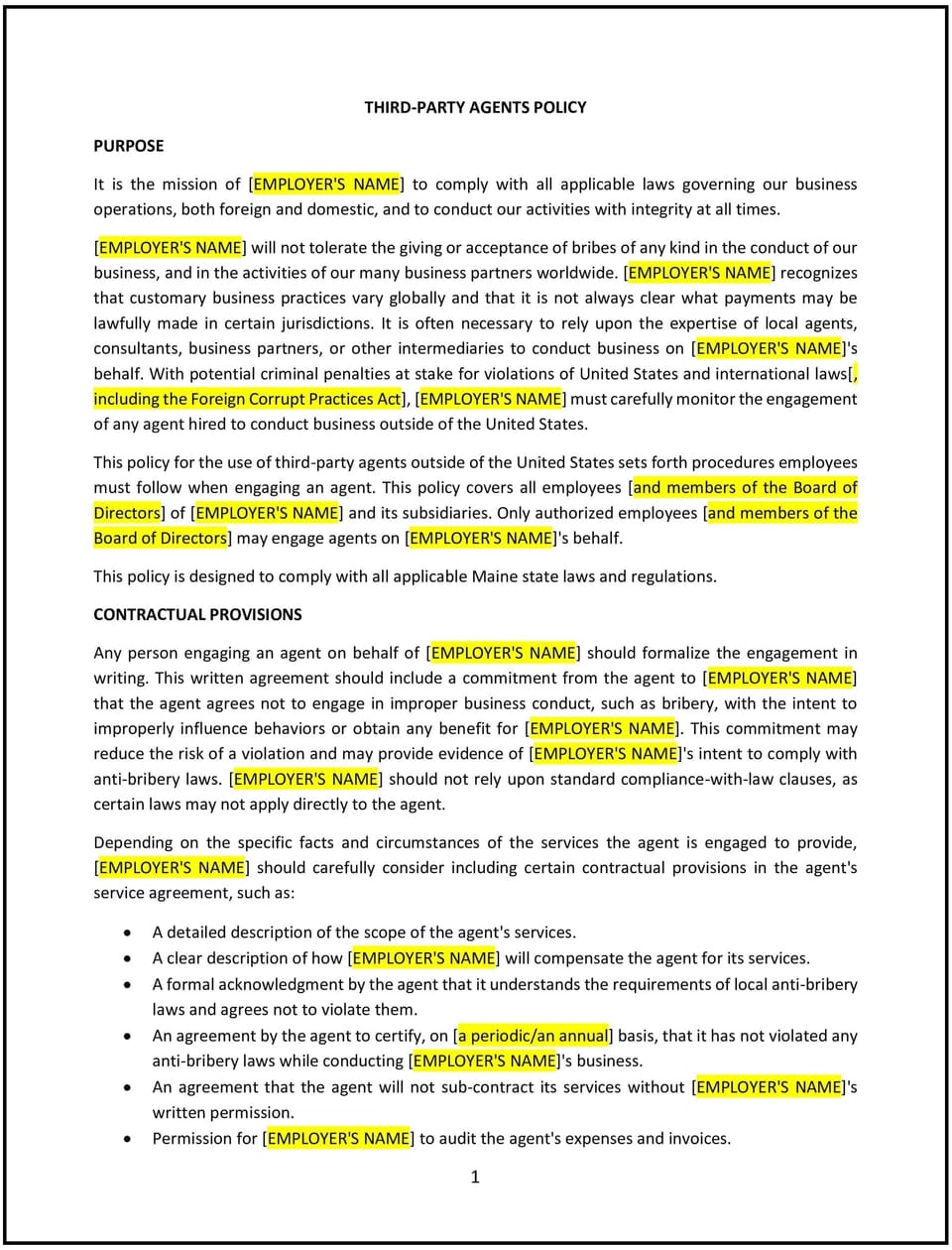Third-party agents policy (Maine): Free template

Third-party agents policy (Maine): Free template
This third-party agents policy is designed to help Maine businesses establish guidelines for managing relationships with third-party agents, contractors, vendors, and service providers. It outlines the expectations for selecting, managing, and monitoring third-party agents to ensure that they align with the business's values, legal requirements, and operational standards.
By implementing this policy, Maine businesses can reduce the risks associated with outsourcing, support compliance with laws, and maintain high standards of integrity and performance when working with third-party agents.
How to use this third-party agents policy (Maine)
- Define third-party agents: Clearly define who qualifies as a third-party agent, including contractors, vendors, service providers, and other external parties hired to perform services on behalf of the business.
- Set selection criteria: Establish clear criteria for selecting third-party agents, such as their qualifications, reputation, and alignment with the company’s values and compliance standards.
- Address compliance with laws and regulations: Ensure that third-party agents comply with all relevant Maine state laws, federal regulations, industry standards, and the company’s internal policies.
- Establish performance expectations: Specify the performance standards that third-party agents must meet, including quality of service, timelines, and deliverables, and how performance will be measured.
- Include monitoring and oversight procedures: Outline how the company will monitor and evaluate the work of third-party agents, including periodic reviews, audits, and performance assessments.
- Address contract terms: Detail the contract terms with third-party agents, including confidentiality, intellectual property rights, and termination clauses to ensure protection for both parties.
- Set dispute resolution procedures: Provide guidelines for resolving disputes with third-party agents, including mediation, arbitration, or other methods of conflict resolution.
- Review regularly: Update the policy periodically to reflect changes in business practices, legal requirements, or the third-party agent landscape.
Benefits of using this third-party agents policy (Maine)
Implementing this policy provides several benefits for Maine businesses:
- Reduces risks: Minimizes risks associated with third-party relationships, including legal, financial, and reputational risks, by ensuring that agents adhere to agreed-upon standards and regulations.
- Ensures compliance: Helps ensure that third-party agents comply with Maine state laws, federal regulations, and industry standards, protecting the business from liability.
- Promotes quality control: Establishes clear performance expectations and monitoring procedures, ensuring that third-party agents meet the business’s requirements for quality and service.
- Protects business interests: Safeguards the company’s intellectual property, confidential information, and other assets when working with external agents.
- Enhances transparency: Creates a transparent process for selecting and managing third-party agents, promoting fairness and consistency in vendor relationships.
Tips for using this third-party agents policy (Maine)
- Vet third-party agents thoroughly: Perform due diligence before entering into any agreement with third-party agents, ensuring they meet the business’s standards and legal requirements.
- Monitor performance consistently: Regularly assess the performance of third-party agents, ensuring they deliver services in line with contractual agreements and performance expectations.
- Communicate clearly: Maintain clear communication with third-party agents about the business’s expectations, compliance requirements, and any issues that arise during the relationship.
- Address issues promptly: Respond swiftly to any performance or compliance issues with third-party agents to mitigate risks and prevent further complications.
- Stay compliant: Ensure that third-party contracts include provisions that align with Maine’s legal and regulatory framework, and update the policy as necessary to remain compliant.
Q: How can businesses ensure third-party agents comply with relevant laws?
A: Businesses should conduct thorough due diligence, ensure that third-party contracts include compliance clauses, and monitor agent performance regularly to ensure compliance with Maine state laws and federal regulations.
Q: What criteria should be used when selecting third-party agents?
A: The selection criteria should include factors such as the agent’s qualifications, reputation, track record of compliance, financial stability, and alignment with the business’s ethical standards and values.
Q: How can businesses monitor the performance of third-party agents?
A: Performance can be monitored through regular reviews, audits, and evaluations against agreed-upon service levels, quality standards, and timelines, as outlined in the third-party contract.
Q: What should be included in contracts with third-party agents?
A: Contracts should include terms related to confidentiality, intellectual property rights, performance expectations, deliverables, compliance with laws, dispute resolution procedures, and termination clauses.
Q: How should businesses handle disputes with third-party agents?
A: Disputes should be handled in accordance with the dispute resolution procedures outlined in the contract, which may include mediation, arbitration, or other mutually agreed-upon methods of resolving conflicts.
Q: Can businesses terminate agreements with third-party agents?
A: Yes, businesses can terminate agreements with third-party agents, but the process and conditions for termination should be clearly outlined in the contract to avoid legal disputes.
Q: How often should businesses review their third-party agent policy?
A: The policy should be reviewed annually or whenever there are significant changes in the third-party agent landscape, business practices, or legal requirements to ensure it remains effective and compliant.
This article contains general legal information and does not contain legal advice. Cobrief is not a law firm or a substitute for an attorney or law firm. The law is complex and changes often. For legal advice, please ask a lawyer.


